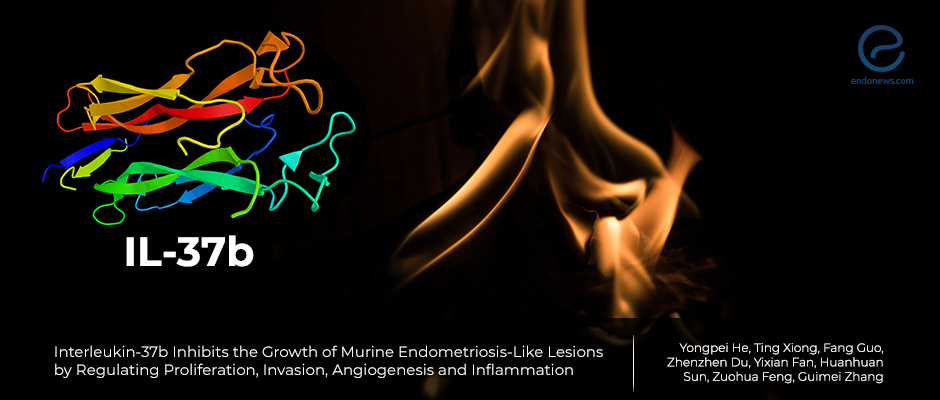Interleukin-37b inhibits the growth of murine endometriosis-like lesions
May 6, 2020
Potential therapeutic effects of IL-37b in endometriosis
Key Points
Highlights:
- In vivo administration of Interleukin-37b (IL-37b) causes a significant reduction in the development of endometriosis in a murine model.
- Inhibition of Akt and ERK1/2 signaling emerges as a potential mechanism through which IL-37b inhibits the growth of endometriotic lesions.
Importance:
- The study suggests a novel mechanism associated with endometriosis.
- Further validation of this mechanism may be applied to develop a potential clinical strategy to treat endometriosis.
What’s done here?
- Using a murine model for in vivo studies and conducting in vitro experiments using mouse uterine tissue fragments, the role of IL-37b in the regulation of endometriotic lesion growth was investigated.
- Further functional assays were used to elucidate the pathways through which IL-37b exerts its effect in endometriotic lesions.
Key results:
- In vivo experiments showed that IL-37b has a role in inhibiting the growth of endometriotic lesions and in vitro experiments using mouse uterine tissue fragments supported these findings.
- The effect of IL-37b was not found to be dependent on macrophages.
- IL-37b treatment reduced the expression of angiogenic and inflammatory factors in ectopic lesions, uterine segments, and endometrial cells and decreased the ability of ESCs to invade.
- Further functional assays demonstrated that IL-37b inhibits the growth of endometriotic lesions by targeting the AKT and Erk1/2 signaling pathway.
Limitations of the study:
- The experiments are well thought and were conducted with appropriate controls.
- Inclusion of in vivo experiments to validate the in vitro data is useful to establish the clinical relevance.
- How Akt and Erk1/2 signaling pathway and the expression of inflammatory and angiogenic factors piece together in endometriosis needs further clarification.
Lay Summary
Endometriosis is a chronic gynecological disease that causes chronic pain and infertility in women. Despite continuous efforts and numerous research, there is, ultimately, still much to understand about the pathogenesis of endometriosis. Inflammatory factors including several interleukins have already been shown to be abnormally expressed in patients with endometriosis.
This study, authored by He et al. and published in "Molecular Human Reproduction", aims to investigate the role of a splice variant of IL-37, which is a new member of IL-1 family that can suppress inflammation and immunity, in endometriosis in vivo and in vitro.
IL-37b treatment significantly repressed the development of endometriotic lesions in vivo, without having any effect on the early stage lesion formation.
The authors showed that the effect of IL-37b could not be reversed by macrophage depletion indicating that the outcome was not dependent on macrophages. Furthermore, the expression of inflammatory factors as well as angiogenic factors was reduced significantly in ectopic lesions upon administration of IL-37b. Phosphorylation of Akt and Erk1/2 in uterine segments were found to be decreased following in vitro treatment with IL-37b.
Functional assays conducted using endometrial stromal cells isolated from mice showed that IL-37b treatment decreased cell proliferation, invasion, angiogenesis, and the expression of inflammatory factors. These results were further validated by using an epithelial cell line and transfecting them with IL-37b.
The study concluded that IL-37b inhibits the growth of endometriotic lesions by targeting angiogenic and inflammatory factors in these lesions and suppressing the Akt and Erk1/2 signaling pathway. More importantly, upon further validation, these findings could be used to develop a potential clinical strategy to treat endometriosis.
Research Source: https://pubmed.ncbi.nlm.nih.gov/32119739/
endometriosis interleukin AKT ERK signaling pathway murine inflammatory cytokines chronic disease endometriosis stage early stage

